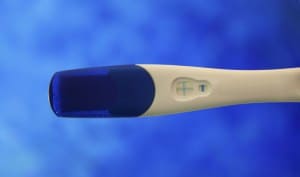All pregnancies require careful monitoring in the first trimester to insure the embryo implanted properly and is developing in the appropriate location. However, infertility patients may be at a higher risk of miscarriage and ectopic (outside the uterus) pregnancy depending upon their treatment to conceive and medical history. Hopefully you are taking daily prenatal vitamins for adequate folic acid to reduce the risk of neural tube defects like Spina Bifida and Cleft Palate – if not, then start now!
 So, how do we know if your pregnancy is healthy in the first trimester? Here are my 5 trigger signs…
So, how do we know if your pregnancy is healthy in the first trimester? Here are my 5 trigger signs…
hCG Levels
The Hormone of Pregnancy, Human Chorionic Gonadotropin or hCG, is detected in the urine at the time of the first missed menses. Produced from placenta tissue of the early embryo, hCG can provide clues to the healthy development and even location of a pregnancy. The blood levels and rate of rise of hCG can either be reassuring or prompt more testing.
Every 48 hours, the hCG level should minimally increase slightly more than 50%. Keep in mind, deviations from a normal rise in hCG occur: 15% of normal pregnancies do not rise appropriately and 15% of abnormal pregnancies do rise normally. Further, transvaginal ultrasound should visualization a pregnancy inside a woman’s uterus when the hCG level is above 2000 mIU/mL, but exceptions occur here as well.
Thyroid
During the 1st trimester, the fetus has not acquired independent thyroid function so it relies on mom’s thyroid hormone. As a result, the mother’s thyroid function test (TSH) requires a more strict range of normal to insure baby receives appropriate amounts of thyroid hormone especially in the first trimester. The American Thyroid Association and Centers for Disease Control and Prevention recommend TSH levels between 1 and 2.5 preceding and during pregnancy. Moreover, multiple studies have shown a negative effect on a baby’s neurologic and cognitive development if mom experienced untreated thyroid dysfunction during pregnancy.
Bleeding
Don’t panic. In the 1st trimester, 1/3 of pregnancies can experience vaginal bleeding with 50% resulting in a healthy baby. The evaluation consists of insuring the patient is not severely anemic from bleeding to prompt surgery, hCG blood levels (as reviewed above) along with transvaginal ultrasound to determine the location and health of the pregnancy. There is no proven value to prescribe blood progesterone levels, progesterone vaginal suppositories, or bed rest. Of importance, a Rhogam injection is necessary within three days of bleeding onset in women who are Rh factor negative and partner is Rh factor positive or unknown. This injection reduces the risk of mom developing antibodies against the red blood cells of the fetus that can cause mild anemia up to fetal death.
Fetal Heart Rate (FHR)
With the use of Doppler Technology, doctors allow a woman as early as six weeks pregnant to hear the sound of their fetus’ heartbeat. The normal FHR ranges between 120 and 160. In the first trimester, a repeatedly below normal FHR especially, when associated with poor fetal growth, is very concerning for a healthy pregnancy outcome. A single reading should NOT make a diagnosis of an abnormal fetus because physiologic changes result in FHR fluctuations. Following eight weeks and 10 weeks of pregnancy with a documented normal FHR, the risk of fetal loss is < 5% and < 1-2%, respectively.
Fetal Measurement
With accurate dating of conception by a women’s menstrual cycle or, more optimal, by ovulation detection, transvaginal ultrasound can measure the fetus to determine whether growth is consistent with the estimated gestational age or EGA. As with FHR, one measurement does not usually make a diagnosis of an abnormal pregnancy due to the range of error using ultrasound technology and the inaccuracies of the definitive conception date in a spontaneous pregnancy.
However, recent guidelines define a non-viable pregnancy as an embryo measuring >7mm without a heart rate. Infertility patients who have undergone assisted reproductive technology have more precise conception dating. The earlier the pregnancy ultrasound, the more accurate the measurement by ultrasound so a lag in fetal growth is much more concerning.






